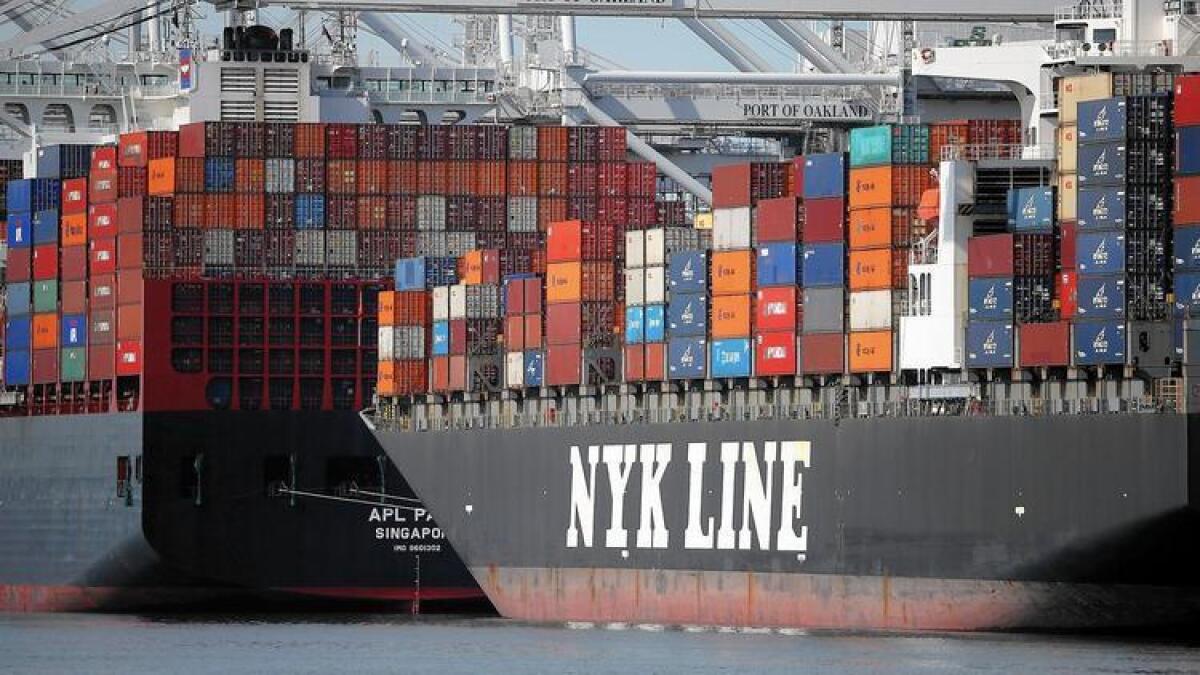Official claims bad blood with union boss bred West Coast port crisis

A lawsuit filed last month in Los Angeles Superior Court offers a vividly detailed picture of the obscure waterfront politics that brought Pacific Rim commerce to its knees for several tense weeks earlier this year.
The suit, filed by a low-level dock official who says the bad blood between him and a labor leader fueled the dispute that threatened to shut down West Coast ports in February, accuses the International Longshore and Warehouse Union and shipping companies of defaming and failing to pay him.
David Miller, a 64-year-old arbitrator of workplace disputes in the ports of Los Angeles and Long Beach, asserts in his suit that ILWU President Robert “Big Bob” McEllrath tried to pressure him to sign off on an illegal work action by union members during a clandestine meeting at a Starbucks in Long Beach.
Miller’s refusal, the suit says, led McEllrath to take revenge by insisting that he be fired as a condition of the new contract that union and shipping officials hammered out. That demand, which shipping companies initially resisted, led to a stalemate that clogged ports and eventually required federal intervention.
Miller declined to comment, referring The Times to his 30-page complaint and 80 pages of legal exhibits. McEllrath and Bobby Olvera Jr., president of the ILWU in Los Angeles and Long Beach, did not immediately return calls for comment.
A spokesman for the Pacific Maritime Assn., which represents shipping companies, said Monday the group was aware of the lawsuit but would not comment while it was pending.
Miller asserts in his complaint that it began over coffee with McEllrath and John Fageaux Jr., another union official, in late 2011. McEllrath urged Miller to approve picket lines at several shipping companies and to “fix” any arbitration with shipping companies that might arise, the lawsuit states.
When Miller said he would rule against the action because it was illegal under the terms of the workers’ contract, McEllrath said, “You’ll be sorry later,” according to the suit. Miller ordered union members back to work in early 2012 when they formed picket lines.
From then on, the complaint alleges, “‘Big Bob’ seethed as he bided his time waiting for the right opportunity to retaliate against Miller.”
According to the lawsuit, retaliation came during negotiations between the ILWU and shipping companies over a new contract last year.
In August 2014, Miller asserts, both sides stopped paying him. As a result, he was unable to afford his mortgage payments and began taking money out of his retirement savings.
In January, according to the lawsuit, during a “tirade” in front of union and shipping officials, McEllrath said Miller was taking bribes, insisting that “Miller has got to go” before a deal could be reached.
In a response to Miller’s complaint, attorneys for McEllrath, the union and shipping companies urged that most of Miller’s accusations be dismissed for technical reasons, while criticizing the “colorful descriptions and vitriol” of his lawsuit.
In February, sources close to the negotiations told The Times that Miller’s fate was the main sticking point in the negotiations. Both shipping and union officials came under intense political pressure as word leaked from the bargaining room that the main point of contention in their talks was the union’s demand that a single person be fired.
Los Angeles Mayor Eric Garcetti called the impasse “crazy,” while Sens. Dianne Feinstein and Barbara Boxer issued a joint statement calling it “highly disappointing that with so much at stake, you have not been able to come up with a path forward on this one remaining issue.”
A tentative agreement was ultimately brokered by U.S. Labor Secretary Thomas Perez after the White House grew worried about the labor dispute’s effects on American businesses.
According to the new tentative contract, a copy of which was obtained by The Times, the current arbitrators, including Miller, will be replaced within two weeks of the tentative contract’s approval by union members and shipping companies.
For more news from L.A. City Hall, follow @petejamison
More to Read
Sign up for Essential California
The most important California stories and recommendations in your inbox every morning.
You may occasionally receive promotional content from the Los Angeles Times.











